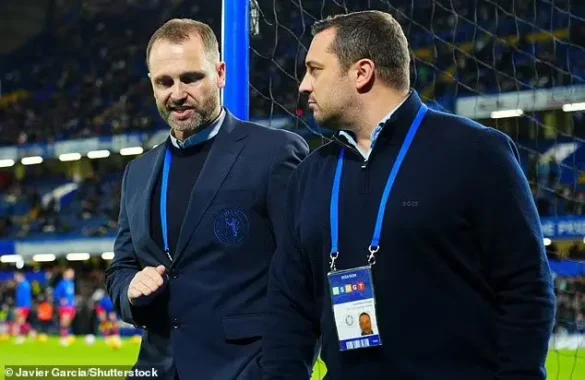BREAKING NEWS: Paul Winstanley and Laurence Stewart have revealed the real reasons behind Chelsea’s strategy of offering long-term contracts

Since Todd Boehly and Clearlake Capital took over ownership of Chelsea in 2022, the club has consistently offered new signings lengthy contracts, often lasting six or seven years, extending well into the 2030s.
Recently, Cole Palmer and Nicolas Jackson extended their contracts with Chelsea, committing to the club until 2033, giving them an unusually long nine years remaining on their current deals.
Chelsea has faced criticism for this approach, with concerns voiced by figures such as former player Emmanuel Petit.
Petit argues that long-term deals may reduce a player’s motivation, as they might feel they no longer need to prove themselves once they have secured such a contract.
Despite this critique, Chelsea’s management continues to justify the strategy.
One of the initial reasons behind offering extended contracts was financial.
By spreading the cost of a player’s transfer over the length of their contract, the club could manage its financial outlay more effectively.
However, that particular advantage has now been limited by recent regulations, which allow transfer fees to be spread over a maximum of five years.
This change has led many to speculate that Chelsea’s primary motivation for these long-term contracts was related to PSR (Profit and Sustainability Regulations).
Yet, according to Chelsea’s technical director Paul Winstanley and co-sporting director Laurence Stewart, this was never the primary reason.
In a rare interview with *The Telegraph*, Winstanley explained the club’s rationale.
He noted that many people tend to stick with what has traditionally worked, but Chelsea’s ownership was forward-thinking and wanted to implement new strategies.
Winstanley expressed confidence in the club’s approach, stating that after reviewing it together, they saw clear potential in this method, which is why they chose to continue it.
Regarding the speculation around PSR benefits, Winstanley pointed out that since the financial loophole had been closed and the club was still using long contracts, it proved that PSR was not the main reason behind their strategy.
If the goal was purely financial, they would have stopped offering long deals once the rules changed.
He emphasized that the club’s leadership had other priorities in mind when discussing how these contracts could work long-term.
Other clubs are now adopting a similar approach, as evidenced by Aston Villa’s recent decision to offer Jhon Duran a contract lasting until 2030.
Stewart explained that these lengthy deals reflect the clubs’ confidence in the players’ talent and their long-term value.
He highlighted that identifying talent is crucial when offering such extended contracts, and equally important is the club’s ability to develop these players.
Stewart further emphasized that player development is a key internal focus for Chelsea.
The club’s goal is to continuously improve its players across all teams, ensuring that they can maximize their potential and contribute to the club’s long-term success.
This, according to Stewart and Winstanley, is the true value of the long contracts, which are designed to ensure that the club not only secures talent but also fosters growth and improvement over time.
Chelsea’s strategy of offering long-term contracts to players, extending as far as nine years, has generated considerable discussion in football circles. While initially seen as a financial maneuver to spread transfer costs and comply with PSR (Profit and Sustainability Regulations), this rationale has been challenged by recent changes limiting how transfer fees can be amortized to a maximum of five years.
Despite this regulatory shift, Chelsea’s technical director Paul Winstanley and co-sporting director Laurence Stewart insist that financial motives were not the primary driving factor. In an interview with *The Telegraph*, Winstanley explained that Chelsea’s ownership sought to be innovative, focusing on the long-term development and retention of talent. They believe that offering such extended deals demonstrates their confidence in players’ potential and their ability to help them grow over time.
This approach has not been without its critics, including former player Emmanuel Petit, who voiced concerns that such contracts might reduce players’ motivation to continually prove themselves. However, Chelsea’s leadership maintains that their priority lies in building a strong foundation for sustained player development and success. The club’s continued use of long-term deals, even after financial regulations changed, suggests a focus on player progression rather than mere cost management.
As other clubs, like Aston Villa, begin adopting similar contract strategies, it’s clear that Chelsea’s long-term vision is reshaping how top football clubs think about player contracts and development.








